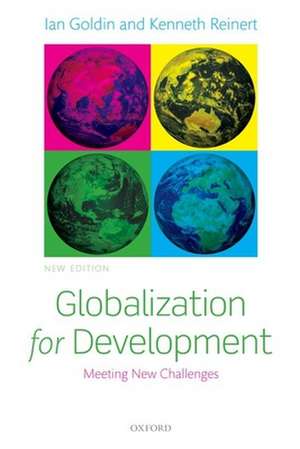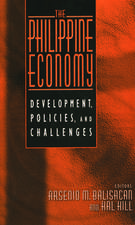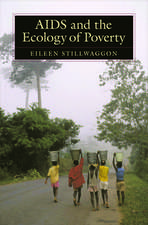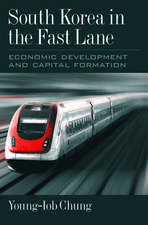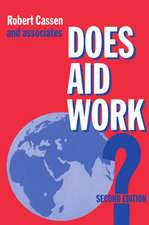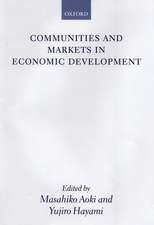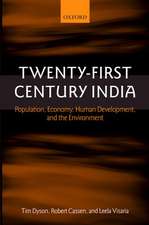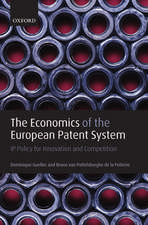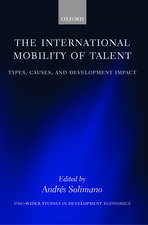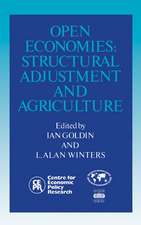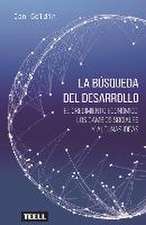Globalization for Development: Meeting New Challenges
Autor Ian Goldin, Kenneth Reinerten Limba Engleză Paperback – 16 feb 2012
| Toate formatele și edițiile | Preț | Express |
|---|---|---|
| Paperback (1) | 323.38 lei 31-37 zile | |
| OUP OXFORD – 16 feb 2012 | 323.38 lei 31-37 zile | |
| Hardback (1) | 762.96 lei 31-37 zile | |
| OUP OXFORD – 16 feb 2012 | 762.96 lei 31-37 zile |
Preț: 323.38 lei
Preț vechi: 372.71 lei
-13% Nou
Puncte Express: 485
Preț estimativ în valută:
61.89€ • 64.37$ • 51.09£
61.89€ • 64.37$ • 51.09£
Carte tipărită la comandă
Livrare economică 03-09 aprilie
Preluare comenzi: 021 569.72.76
Specificații
ISBN-13: 9780199645572
ISBN-10: 0199645574
Pagini: 354
Ilustrații: 47 Figures, 15 Tables, 14 Boxes
Dimensiuni: 154 x 233 x 29 mm
Greutate: 0.55 kg
Ediția:New.
Editura: OUP OXFORD
Colecția OUP Oxford
Locul publicării:Oxford, United Kingdom
ISBN-10: 0199645574
Pagini: 354
Ilustrații: 47 Figures, 15 Tables, 14 Boxes
Dimensiuni: 154 x 233 x 29 mm
Greutate: 0.55 kg
Ediția:New.
Editura: OUP OXFORD
Colecția OUP Oxford
Locul publicării:Oxford, United Kingdom
Recenzii
This book is essential reading for anyone interested in globalization and development. It provides important new insights and perspectives into how global flows of finance, trade, migrants, and ideas shape development and advances the debate by identifying urgently needed policy changes for a more inclusive globalization.
Globalization may need defense, but it also needs reform. The authors tell us the story so far and go on to propose ways and means of getting to a happier ending. The ways identified, based on fine empirical assessment, certainly deserve our serious attention.
This book cuts through the confusion of many discussions of globalization. In particular, it gives a clear definition in terms of the basic flows that embody interaction among countries, including trade, migration, and so on. This provides a clear analytical framework for analyzing the impact of globalization on development and thus on reducing poverty. It is a first-class piece of work and a 'must-read' for those seeking clarity on one of the great issues of our time.
This book draws on a wealth of cross-country experience and knowledge to demonstrate that globalization has the ability to contribute to poverty alleviation, but only under certain circumstances. As such, it provides invaluable insight to development practitioners and policy makers alike. It contains not only a lucid analytical framework in which to analyze these tradeoffs, but also some invigorating ideas on how globalization can be made to work for the poor. In this, it is a vital area for anyone concerned about a fairer sharing of our communal prosperity.
Ian Goldin has been at the centre of action in the debate on globalization and development for a long time. His collaboration with Ken Reinert on this subject is a must for those who are looking for both courageous conceptual design and practical solutions." "Much has happened since the first edition of this skilful overview of issues in globalization and development. The recent turmoil in the Euro-zone and the world economy make this edition all the more timely.
This analysis goes beyond theory and suggests national and global policies to be adopted in order to address the dire matter of poverty. This well written book convinces readers that globalization can be made to work for the poor and is an essential guide for practitioners in this field.
This is a clearly written and well-planned book focusing on how globalisation can help alleviate povery in the developing world. ... This is therefore a timely book addressing the concerns of those who might have been influenced by some of the more vocal critics in the globalisation movement.
Globalization may need defense, but it also needs reform. The authors tell us the story so far and go on to propose ways and means of getting to a happier ending. The ways identified, based on fine empirical assessment, certainly deserve our serious attention.
This book cuts through the confusion of many discussions of globalization. In particular, it gives a clear definition in terms of the basic flows that embody interaction among countries, including trade, migration, and so on. This provides a clear analytical framework for analyzing the impact of globalization on development and thus on reducing poverty. It is a first-class piece of work and a 'must-read' for those seeking clarity on one of the great issues of our time.
This book draws on a wealth of cross-country experience and knowledge to demonstrate that globalization has the ability to contribute to poverty alleviation, but only under certain circumstances. As such, it provides invaluable insight to development practitioners and policy makers alike. It contains not only a lucid analytical framework in which to analyze these tradeoffs, but also some invigorating ideas on how globalization can be made to work for the poor. In this, it is a vital area for anyone concerned about a fairer sharing of our communal prosperity.
Ian Goldin has been at the centre of action in the debate on globalization and development for a long time. His collaboration with Ken Reinert on this subject is a must for those who are looking for both courageous conceptual design and practical solutions." "Much has happened since the first edition of this skilful overview of issues in globalization and development. The recent turmoil in the Euro-zone and the world economy make this edition all the more timely.
This analysis goes beyond theory and suggests national and global policies to be adopted in order to address the dire matter of poverty. This well written book convinces readers that globalization can be made to work for the poor and is an essential guide for practitioners in this field.
This is a clearly written and well-planned book focusing on how globalisation can help alleviate povery in the developing world. ... This is therefore a timely book addressing the concerns of those who might have been influenced by some of the more vocal critics in the globalisation movement.
Notă biografică
From 2001 to 2006, Prof. Goldin was at the World Bank, where he served as Director of Development Policy (2001 to 2003) and Vice President (2003 to 2006). From 1995 to 2001 he was Chief Executive and Managing Director of the Development Bank of Southern Africa. During this period, he served as an advisor to President Mandela. Previously, he worked at the European Bank for Reconstruction and Development (EBRD) and at the OECD Development Centre. Prof. Goldin holds a B.Sc. and B.A. (Hons) degree from the University of CapeTown, a M.Sc. from the London School of Economics and an M.A. and D.Phil. from the University of Oxford. He has received numerous awards and prizes, and has been knighted (Chevalier) by France and was nominated Global Leader of Tomorrow by the World Economic Forum. He has published over fifty articles and thirteen books, including Exceptional People: How Migration Shaped Our World and Will Define Our Future (PUP, 2011) and The Economics of Sustainable Development (CUP, 1995).Professor Reinert received his Ph.D. in Economics from the University of Maryland and held the positions of Senior International Economist at the US International Trade Commission and Associate Professor of Economics at Kalamazoo College. He has consulted for the World Trade Organization, the World Bank, the OECD Development Centre, and the US Department of Commerce. Professor Reinert has published over 60 journal articles and book chapters in the areas of international trade, economic development, and environmental policy. He has co-edited Applied Methods for Trade Policy Analysis: A Handbook (CUP, 1997), was Lead Editor-in-Chief of the two-volume Princeton Encyclopedia of the World Economy (PUP, 2009), and authored An Introduction to International Economics: New Perspectives on the World Economy (CUP, 2012).
